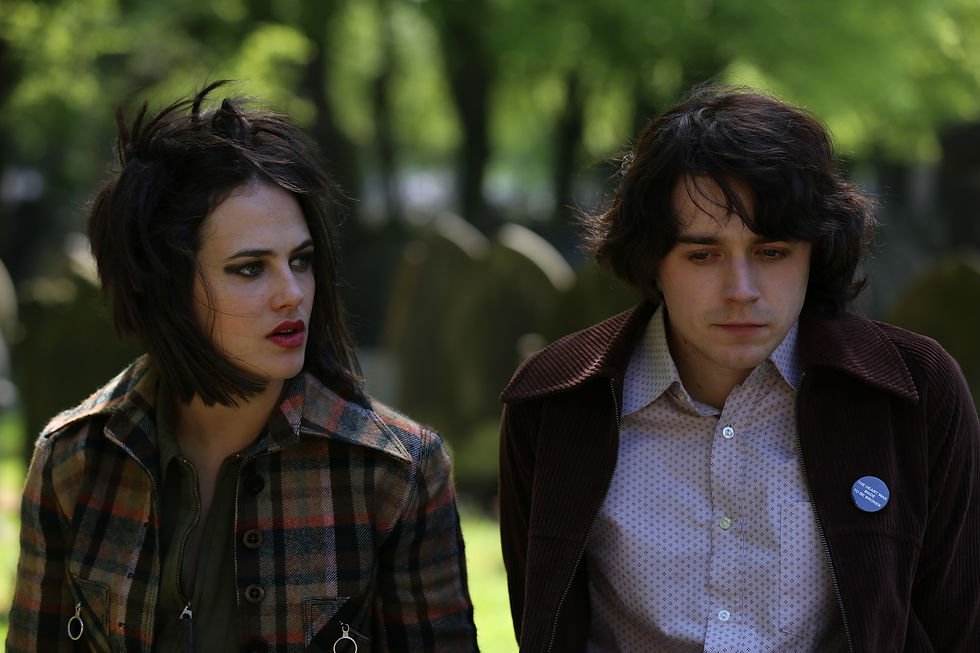
Jack Lowden as Stephen Patrick Morrissey
Mark Gill, the director of England Is Mine, an unusual biopic of the anything but usual vocal/lyrical half of those now famous Smiths’ songs, explains why for him there was only one way to tell this story.
HERE’S the problem for writer/director Mark Gill in one off-camera moment before this interview even starts. It’s the morning after a heavy snow dump in England’s north west and Gill’s partner is wondering if she should attempt to get to work through the snowbound valley in which they live.
I can’t help myself and offer “You should tell her if you must go to work tomorrow, well if I were you I wouldn’t bother”.
Of course he knows the reference. The same Smiths song from which I borrowed that line, Still Ill, gave Gill the name of his film about the pre-Smiths days of Stephen Morrissey, England Is Mine.
It was in fact the first Smiths line she ever laughed at he reveals. He was a Smiths fan. And she is still with him. Which is brave.
But this is what Gill was up against making a film about Morrissey before he was Morrissey, if you will. When he was Stephen to anyone who knew him – and probably that poncy bloke always in the corners at parties, to those who didn’t know him.
All the Smiths fans know the songs backwards, can quote them liberally, sadly usually without prompting, and probably spend half the film looking for either clues to future songs or sly references to them.
And yet there is no Smiths in England Is Mine. The story told here ends several months before the fruits of a meeting with Johnny Marr (a meeting that ends the movie) would emerge as songs, as a shared vision, as Morrissey and Marr, the fulcrum of the Smiths.
“Once I realised how they met, Johnny [played in the film by Laurie Kynaston] rocks up at his front door,” says Gill, who had an Oscar nomination for a short film, The Voorman Problem, and a BAFTA nomination, but for whom this is his first feature film. “I thought that was the end of something and the beginning of something else.”
In this beginning, quite deliberately rather than because the notoriously prickly Morrissey would probably not have given them permission to use material anyway, there are no Smiths songs or overt references to coming Smiths songs throughout England Is Mine.
It’s true that using a Smiths song would have made that lyric the story at each turn, but the fact is Gill just couldn’t see himself making a film about Morrisey; it always had to be about Stephen.
I put it to Gill that with Morrissey being such a construct – of his own making and of ours, for all of us in some way projected our needs onto him – that a film about him as we (think we) know him would have battled to find a real centre in the conflicting tales and tortured career of Morrissey and the Smiths.
“This is what I struggled with,” he says. “I never, ever considered making a film about the Smiths because I just didn’t see where the story lay.”

Writer/director Mark Gill
As much can be told by the music used, as well as that not used. Gill became taken with the idea of Stephen (played by Jack Lowden, recently seen in Christopher Nolan’s Dunkirk) having “this internal soundtrack that was always out of step with everyone else” in keeping with a character who is near fatally out of step.
(As my daughter – a next generation Smiths fan, for her sins - noted while watching the film: “gee he must have been fun at parties”.)
So without the well known catalogue, the director decided to see what part of this “quite rich”, albeit internal and conflicted life, he could tell through music, the soundtrack using appropriate (New York Dolls, Shangri-Las, Billy Fury) and quirky but apt choices (George Formby – possibly the only classic post-War British figure not to appear on a Smiths or Morrissey single or album sleeve – over a scene where the Sex Pistols perform in Manchester) to convey the story.
But still, Stephen is someone who was observing even if he was not engaging, and those lyrics tell us that all he observed became key to all that he would do, and sing about, from Manchester schools (run by belligerent fools, of course) to bantering over the graves beyond the cemetery gates (where Keats and Yates are on your side, but Wilde is on mine).
That said, there is no attempt to show the nascent “genius” about to burst out. This Stephen is almost comically withdrawn and internalised, a boy-man scared of life, a clerk in Inland Revenue who dreamt of being a writer like his Irish mother’s favourite, Oscar Wilde, but whose only public writing was slagging off bands in the NME.
A boy-man who is told, not without reason and not before time, “Stephen, do something” because doing nothing, but hating the world for not seeing that something special was there, was easier.
“That’s always been my fascination with him,” says Gill. “I grew up in the same streets [in Manchester’s Stretford] and it wasn’t a ghetto by any stretch of the imagination but it could be quite hard if you were different. He is 15 years older than me so Manchester at that time was probably even less forgiving of someone of his character.
“So it interested me what came before the music and I think the temptation of bio-pics is to portray every one as a genius from the beginning [but] with Morrisey I think he stumbled towards it and I think the only way I could relate to the character of Stephen was to make him as normal as possible, with all the aspirations and flaws any young person has.”
Perhaps surprisingly for those who only read the surface of the Morrissey story, or who wanted the boy genius revealed as self-actualised, England Is Mine really is a film about women: those who supported him, encouraged him, inspired him – made him. From his mother to several good friends, one he abandons, one who abandons him, they are the strength and the drive..

Jessica Brown Findlay, as Linder, and Jack Lowden, as Stephen
“That’s taken from my personal life in a sense,” says Gill. “Film has to be deep and personal to a writer and director. I didn’t ever struggle for girlfriends but I know that I was surrounded by a lot of those type of girls: very driven, very strong, very mature, worldly beyond the boys of the same age. They seemed to know what they wanted and even if they didn’t they seem to project it. And I was raised in a family very strong matriarchal figures who took no shit.
“I think what Morrisey showed me in particular, and that’s one of the fascinations for young men, is you didn’t have to be an alpha male 24 hours a day. That wasn’t a skin I particularly fitted in. I think Will Self the writer said brilliantly that Morrison spoke to the homoerotic in the heterosexual male: it allowed us to feel what that might be like.”
If it’s a film of women it is also a film of shadings: England Is Mine is most certainly not suffused in sunlight and cheery brightness. The whole world here is, if not grey, then certainly dimly lit; closed in and restricted.
As strongly urged on Gill by Billy Duffy - later of the Cult, who was a childhood friend of Morrissey’s, briefly a bandmate, and now a consultant for the film - the streets are half-seen, the shadows laced with implied, or impending violence.
But really, how else could you portray young Stephen, and old Manchester?
“It’s one of the things I’ve been criticised for but I just felt I’d been criticised by latte drinking middle-class journalists in the M25 circle in London who probably don’t know where the North of England is, and certainly not what it was like in the ‘70s and ‘80s,” says Gill tartly.
Gill remembers growing up with “nights at home listening to the Smiths – because you couldn’t got out as it was raining – and you could hear the rain at the window and see the yellow street lights shining. That’s what your teenage life was mostly like. And his was much the same.”
Oh Manchester, so much to answer for?
“I had to create the world that you felt would shape what was to come.”
England Is Mine is in cinemas March 15
